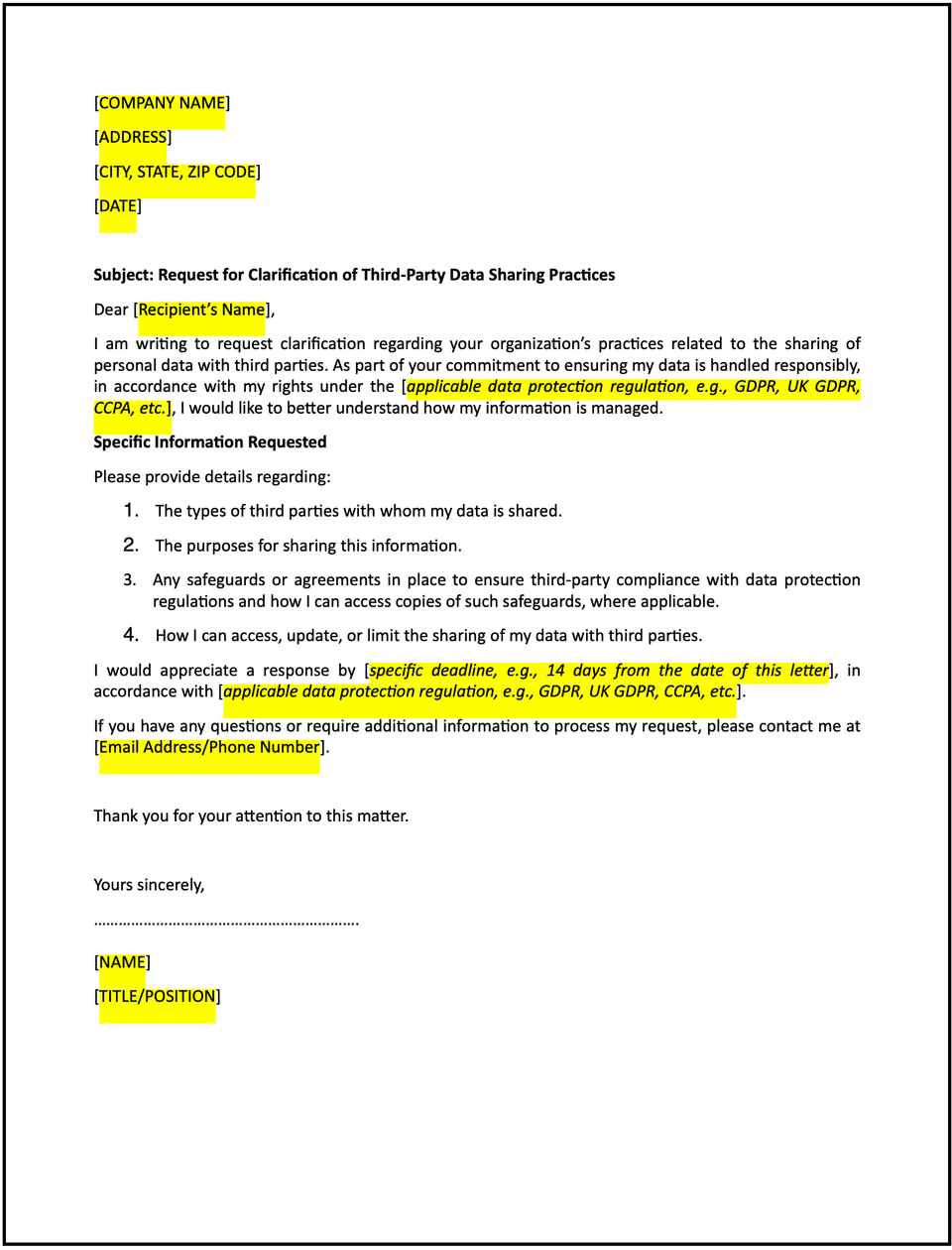Request for clarification of third-party data sharing practices letter: Free template

Request for clarification of third-party data sharing practices letter
Requesting clarification on third-party data sharing practices demonstrates a commitment to transparency and compliance with data privacy standards. This letter provides a professional way to inquire about how data is shared, the parties involved, and the measures taken to ensure privacy.
How to use this request for clarification of third-party data sharing practices letter
- Open with context: Start by referencing your relationship with the recipient, such as a partnership, service agreement, or inquiry about their privacy policy.
- State your request: Clearly specify that you are seeking clarification on third-party data sharing practices.
- Identify areas of concern: Highlight specific aspects you’d like clarified, such as the types of data shared, the third parties involved, or the purposes of sharing.
- Emphasize importance: Explain why this clarification is necessary, such as regulatory compliance, safeguarding customer trust, or understanding your obligations.
- Request supporting details: Ask for any documentation or policies related to data sharing for further review.
- Maintain a professional tone: Ensure the letter is respectful, clear, and focused on fostering understanding.
- Invite engagement: Encourage the recipient to provide additional details or set up a discussion to address your concerns.
Benefits of using a request for clarification of third-party data sharing practices letter
This letter template ensures a structured and professional way to seek clarity while fostering trust and accountability. Here’s how it helps:
- Demonstrates due diligence: Inquiring about data sharing practices shows a proactive approach to privacy and compliance.
- Builds trust: Transparent communication reinforces confidence in your commitment to safeguarding data.
- Reflects professionalism: A well-crafted request underscores your ethical and regulatory standards.
- Prevents misunderstandings: Clarifying data sharing practices ensures alignment and reduces potential risks.
- Strengthens relationships: Open dialogue fosters collaboration and mutual understanding.
Tips for writing an effective request for clarification of third-party data sharing practices letter
- Be specific: Clearly outline the areas of concern and the details you are seeking.
- Use professional language: Maintain a respectful and formal tone to encourage cooperation.
- Highlight importance: Explain why the clarification is crucial for compliance or operational alignment.
- Request supporting materials: Ask for documentation, such as privacy policies or agreements, for review.
- Keep it concise: Focus on the key points without overwhelming the recipient with unnecessary details.
Frequently asked questions (FAQs)
Q: What details should I include in this letter?
A: Include a reference to the relationship, a clear request for clarification, specific questions or concerns, and a request for supporting materials.
Q: Should I personalize the letter?
A: Yes, addressing the recipient directly ensures clarity and fosters engagement.
Q: Who typically receives this letter?
A: Send the letter to partners, vendors, or service providers with access to or who manage shared data.
Q: How formal should this letter be?
A: The tone should be professional and straightforward to encourage cooperation and timely responses.
Q: When should this letter be sent?
A: Send the letter when clarity on data sharing practices is critical, such as during onboarding, audits, or privacy reviews.
Q: Can this letter include a deadline for response?
A: Yes, specifying a reasonable deadline encourages prompt action and ensures timely resolution.
Q: Is acknowledgment from the recipient required?
A: While not mandatory, requesting acknowledgment or confirmation helps ensure alignment and understanding.
This article contains general legal information and does not contain legal advice. Cobrief is not a law firm or a substitute for an attorney or law firm. The law is complex and changes often. For legal advice, please ask a lawyer.


